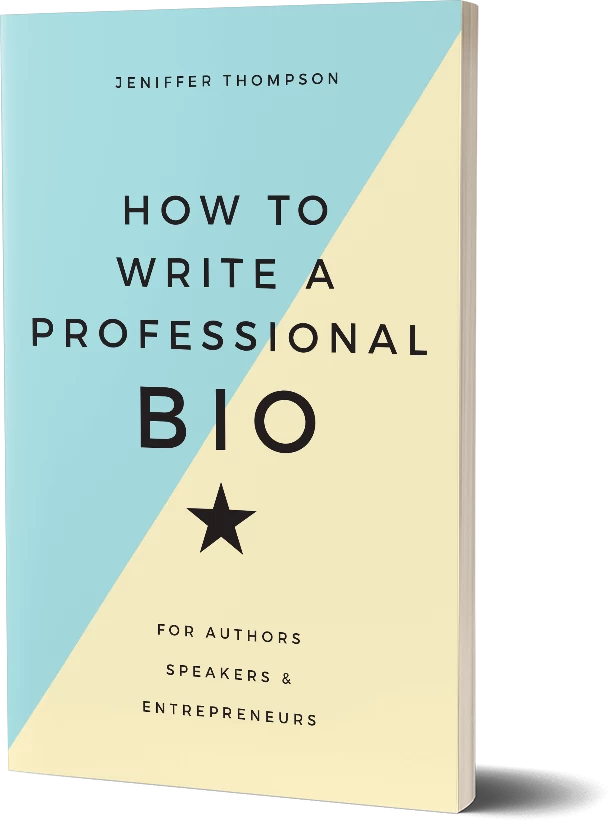Marketing your book relies in part on marketing yourself as an author. So, creating a platform and having a solid author brand is a smart move. And your author bio is part of that. Because of this, your bio may occasionally need updating.
Where Your Author Bio Fits into Your Marketing Plan
Your author bio presents you to the world and represents who you are. It lets readers get to know you, which can help them connect with you. It can help establish your authority. Your author bio is also one of your most used pieces of marketing collateral, so putting the effort in to make it a good one is well worth the effort.
The Many Places You’ll Make Use of an Author Bio
Your author bio will fill many needs and be used across many platforms and places, so having a long version and a short version is always a good idea. For instance, the bio you may use for your book cover will need to conform to word count limits but on your website, you can use a much longer version for your About Me page.
On your website:
Having an author bio on your website is essential. But in this version, you can get creative and go a little deeper with your story. On your About page, you can add all kinds of creative bits of information.
Social media platforms:
Social media bios may be slightly different from your book cover bio but they’ll likely be limited by word or character count there too. Plus, people aren’t expecting long-form content here.
Your book cover:
Your book cover bio needs to be short and sweet. Here you want to pack in as much relevant information as possible while also being succinct.
Print marketing materials:
Depending on how it’s being used, you can add the long or short version of your author bio to your marketing materials. You’ll need to have versions handy for press releases, bylines, one-sheets, or speaker sheets.
Don’t worry, you won’t need to write a separate author bio for every one of these. You can simply create one good author bio and use it as a basis for all your bio needs. But having a standard short and long version bio at the ready is helpful. These bios should also be fresh and relevant to serve you best.
So, Is it Time to Update Your Author Bio?
Certain things in your author bio, like where you were born or where you went to school will remain constant. But circumstances change. And often, things that may have once been relevant aren’t so much anymore.
It may be time to update your bio if it’s been a few years since it was written, or if any of the following apply.
Big life events:
If you got married, switched careers, moved to a new location, or even adopted a pet you can update your bio with this information if it’s relevant.
Accomplishments:
Maybe you’ve won an award, published noteworthy articles, or started speaking as an expert on your topic? Perhaps you’ve earned a new degree or certificate, or received some form of recognition that would lend you more authority? Then definitely update your author bio with this type of information!
New books:
This is a big one. Adding this information to your bio can be as simple as switching out your older book titles with your latest book titles. This matters because it lets readers know you have a new book, but it can also help connect the dots for new readers.
Shifting priorities:
Sometimes bios are written with certain goals in mind. You may find that the tone and focus of your original bio no longer fits with your message. If you want to be taken more seriously, maybe that irreverent bio you wrote a few years ago no longer speaks to you? Or maybe conversely, you’d like to lighten your image a bit?
Either way, keeping your bio fresh and relevant is important. Just like your headshots, if your author bio is really out of date there can be a disconnect between your image and the reality.
What if You Don’t Even Have a Polished and Professional Bio to Update?
Well, if your author bio was written as an afterthought or just to fill in the space and the time has come to get serious about it, then you’ll need to start from scratch. But that’s okay! Your author bio does play an important role in your book marketing strategy but you don’t need to feel intimidated by the idea of writing it. Your author bio is not your life story or a chronological detail of events, and you’re in control of what you want the world to know about you.
Some Things to Consider that Will Help You Write Your Bio
Goals:
Starting with your goals is a good foundation for how everything else on this list will be prioritized. For example, if you want to be taken seriously and known as an authority, you’ll want to use the right tone to convey that. You’ll also want to focus on your accomplishments and expertise. Whereas, if you’re the author of children’s books or write humor you’ll probably have a different set of priorities that will affect the tone of your bio and what you share about yourself.
Tone:
As mentioned, your tone will depend on your goals and the message you want to convey. But tone is also personal and can reflect more of who you are. For instance, maybe you want to be taken seriously but don’t want to come off as boring or harsh. It’s about finding a balance.
Relevancy:
Not everything is going to be relevant to your message. This will be especially true in your shorter version author bio. Some authors find it important to note where they went to university because it grants them authority, while others may feel like direct experience or accomplishments matter more. Of course, some details in your author bio such as having a pet or being married may not be relevant to your book or work, but they add a personal touch.
Length:
Remember, in your shorter version bio there are word and character count limits to consider so keeping it relevant and succinct matters more here. With your longer bio, you can add more details and focus on the overall tone you want to convey and be more revealing and/or creative if you want. For reference, a short bio is usually between 50-200 words, depending on where you’ll use it. Your long version can be from 250-350(or more if it works).
Comfort level:
Another thing to consider when you’re creating your author bio is your comfort level with sharing. You don’t need to add any personal details at all if you’re not comfortable with it. But this can also affect the tone. If you’re keeping it strictly professional be careful not to sound too wooden and dull. On the other hand, some authors really want their personality to shine through and love sharing with their audience. Just remember, that what you do share should be relevant to your goals and your brand.
If you could use some help writing your author bio, Jeniffer, our founder and director, wrote a guidebook on the subject. You can find that here.

Ultimately, your author bio is a major asset for your platform and will be used as part of your book marketing strategy in many ways, so it should be good. Sometimes this means you’ll need to update it. But don’t put too much pressure on yourself. Just get to brainstorming, follow the tips provided, and seek some guidance if necessary.


Recent Comments